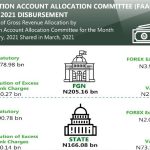2022, the year the African Union has christened the ‘Year of Nutrition’ at the just concluded 35th Ordinary Session of the Union, saw a call for renewed commitment from African leaders to prioritise the health and nutrition of the continent.
This was as the President of the African Development Bank or AFDB, Akinwumi Adesina, particularly urged African leaders to invest in health, saying it is akin to investing in national security.
The eventual rollout of vaccines by so-called developed nations following the outbreak of COVID-19 has prompted debates around vaccine nationalism. Vaccine nationalism is a phenomenon the World Trade Organisation’s (WTO) President, Ngozi Okonjo Iweala, described as an economic strategy “where rich countries are vaccinating their populations, and poor countries have to wait”.
Vaccine nationalism has come to stay regardless of advocacies by the World Health Organisation and the WTO, as developed economies continue to stock up and vaccinate their people irrespective of the short supply in other parts of the world, including Africa.
Today, for instance, while developed countries have moved to booster shots in the fight against COVID-19, Africa is still struggling with basic shots, with only “11% of the population fully vaccinated, and another 16% has been partially vaccinated”, Adesina said.
In his address to African leaders at the session of the Assembly of the African Union in Addis Ababa, Ethiopia, titled, ‘Mobilising Financing for Africa’s Accelerated Economic Recovery, Development and Integration’, Adesina called on leaders to learn from the COVID-19 experience to improve the continent’s health sector and general welfare.
“Africa can no longer outsource the security of the lives of its 1.4 billion people to the benevolence of others. We must secure African lives! It is time, Your Excellencies, to build Africa’s healthcare defence system,” he said.
“This must be based on three strategic priorities. First, building Africa’s quality healthcare infrastructure. Second, building Africa’s pharmaceutical industry and third, building Africa’s vaccine manufacturing capacity. Africa needs $600 million to $1.3 billion to meet its goal of attaining 60% vaccine production by 2040. Investing in health is investing in national security.”
The AFDB boss said that the bank has plans to invest $3 billion to support pharmaceutical and vaccines manufacturing capacity for Africa and made a clarion call on leaders to support efforts at vaccine production to serve the continent’s vulnerable population.
Adesina said as Africa’s premier development financing institution, AFDB has been mobilising resources to meet the challenges of “strengthening resilience in nutrition and food security…, strengthening agro-food systems, health and social protection systems for the acceleration of human, social and economic capital development.”
He said the bank’s general capital increased in 2019 by 125%, rising from $93 billion to $208 billion, the highest since its establishment in 1964.
“These resources have allowed the African Development Bank to scale up support to African economies to tackle the pandemic. The Board of Directors of the Bank approved a Crisis Response Facility of up to $10 Billion. The bank also launched a $3 Billion Fight COVID-19 Social Bond on the international capital markets, which was the largest ever US dollar-denominated social bond in world history. The bank provided $27 million as grants to the African Centers for Disease Control,” Adesina explained.
In 2022, dubbed the 'Year of Nutrition' by the African Union, a renewed focus on health and nutrition was urged by African leaders. The president of the African Development Bank (AFDB), Akinwumi Adesina, highlighted the need for investment in health, comparing it to national security. Discussions regarding vaccine nationalism emerged as only 11% of Africa's population is fully vaccinated, while developed nations advance to booster shots.
Adesina called for improved healthcare infrastructure, a stronger pharmaceutical industry, and increased vaccine manufacturing capacity in Africa. He estimated a requirement of $600 million to $1.3 billion for achieving 60% vaccine production by 2040.
The AFDB plans to invest $3 billion in supporting pharmaceutical and vaccine manufacturing on the continent. The bank has effectively mobilized resources to bolster nutrition, food security, agro-food systems, health, and social protection. With a 125% increase in its capital in 2019, rising from $93 billion to $208 billion, the bank has significantly supported African economies during the pandemic.
Initiatives include a $10 billion Crisis Response Facility and a $3 billion Fight COVID-19 Social Bond, the largest US dollar-denominated social bond in history. Additionally, the AFDB provided $27 million in grants to the African Centers for Disease Control.






